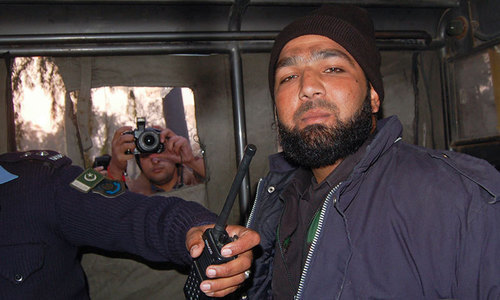ISLAMABAD: After the Supreme Court upheld his conviction and the president turned down his plea for clemency, executing Mumtaz Qadri was the only option the state was left with. However, the swift method of his execution raised several eyebrows.
But, there are conflicting views on the matter. Some argue that the smooth way the execution was carried out could only have been possible under the majority mandate of the PML-N, which has an experienced team that could afford to take the decision and absorb the blowback.
Others argue that with the National Action Plan (NAP) in place and an across-the-board consensus to take on militant organisations, Qadri’s hanging was a natural outcome.
“With military courts regularly disposing of cases of hardened militants, passing and implementing on death sentences, the civilian side (executive & judiciary) was under even more pressure to take responsibility,” remarked one political analyst.
Why wouldn’t the government hang a convict whose crimes had been proven in the court of law, asked Dr Rasool Baksh Rais. A political scientist and academic, Dr Rais said that by carrying out the execution, the government had sent the message that no one was bigger than the state.
A senior official of the interior division told Dawn that after the Supreme Court upheld the death penalty for Qadri twice, the federal government was left with no option but to carry out the execution.
“Following the launch of NAP in December 2014, both the civilian and military leadership have one thing in common, ‘nothing-doing’ with the extremist militant organisations or their sympathisers,” said the official. He recalled the killing of Lashkar-i-Jhangvi chief Malik Ishaq and his two sons in June of last year, and the recent arrests of Naeem Bokhari and Asif Chootu. Similar arrests have also been made in Sindh and Balochistan, he said.
“After the Supreme Court’s ruling, any further delay on its implementation would have only reflected poorly on the civilian side,” the official said. Credit, however, must be given to Prime Minister Nawaz Sharif and the government, who went ahead with the execution, notwithstanding the reaction from the religious right, he maintained.
He also said that the decision to seal Qadri’s fate was likely taken during a meeting between the president and prime minister, held on Feb 23.
According to a security official closely involved with NAP’s implementation, “the breaking of this psychological barrier was long overdue, and it is the judiciary which has led from the front in the case of Qadri”.
In an off-the-record discussion, a sitting member of the federal cabinet told Dawn that people might have different opinions, but the current PML-N government had displayed its liberal credentials throughout its term.
Therefore, the minister explained, it was unfair when people termed the PML-N a right-wing political party. The recent women’s protection legislation and its support for people such as filmmaker Sharmeen Obaid-Chinoy explained everything, he said.
But both actions — the PM’s statements about liberal democracy and the recent passage of the Punjab women’s law, did not go down well with parties such as the JUI-F and Jamaat-i-Islami, who criticised the federal government for hurting Islamic values in the country.
Published in Dawn, March 1st, 2016


















































